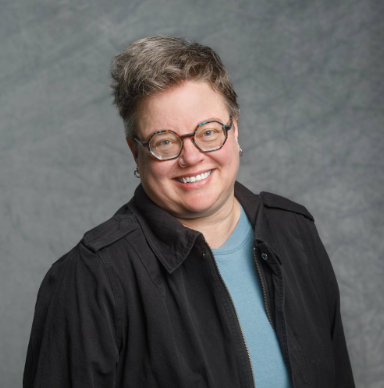Krista Benson is an Associate Professor of the Integrative Studies Program at Grand Valley State University. They are an interdisciplinary scholar who blends diverse inquiries into women’s studies, gender and sexuality, colonialism, and racism with a special focus on marginalized youth. Their current project centers on the imposition of heteropatriarchal gender norms on indigenous youth in “in-state care,” such as forms of foster care and the juvenile justice system. They are currently one of the managing editors of the online journal, Feral Feminisms. They worked as an editorial assistant for Frontiers while completing their dissertation at the Ohio State University.

Benson first engaged the Journal through their hands-on work in helping establish the first Transnational Feminisms Summer Institute at OSU, an endeavor led by Journal co-editor Judy Wu and editorial assistants, Margaret Solic and Denise Delgado. This four-day feminist conference, originally conceived as one sponsored by OSU and Arizona State University, was held in 2014 and welcomed up to 300 participants. This workshop-based and interactive conference was widely a success though the event also reflected the enduring inequalities in feminist academic practices. As Benson notes, many of the gritty organizational details in terms of accessible bathrooms, spaces, and comfortable dorm room accommodations fell to OSU graduate students like themselves. They fondly recall a “rather famous feminist” who got cold and demanded more blankets from the graduate student organizers (Benson, p. 4).
Of note, they describe the tensions that emerged during a talk about Hawai’i which did not fully recognize the plight of Native Hawaiians nor the settler colonial impacts of Japanese Hawaiian residents. As they argue in their interview, transnational feminisms must grapple with indigeneity. Years later, they would participate in the development and publication of a Frontiers colloquium focused on the relationship between decolonization and transnational feminists; an endeavor that included peer reviews, workshopping, and co-writing at the University of Utah.
As a conference organizer and later editorial assistant for Frontiers, Benson was inspired by the Journal’s dedication to working closely with authors. As an editorial assistant, they actively helped emerging authors with suggestions for scholarly works related to their study, and even helped track down scholarly resources not available to under-resourced writers. They recall how submissions were shared by email, a lack of centralization that connected to the challenge in finding and keeping in touch with peer reviewers. They also served as an important resource in the transition of the Journal from OSU to the University of Utah, a highly engaged transition that included on-site and continued engagement between the two editorial teams.
As a graduate student, they deeply appreciated the way that the co-editors allowed them to set boundaries on their time so that they could complete their own graduate studies. Ultimately, they cite their collaborative and author-centered work with Frontiers as an inspiration for their current work as a managing editor for Feral Feminisms.
Find more about Dr. Benson here.
Selected Quotes from Frontiers at 50 Oral History Interview
“(The) editorial team was really supportive of scholars who were under-resourced, so that included graduate students, but also people who were, you know, tenuously employed either as adjuncts or as you know, part-time lecturers or whatever, as well as to scholars from countries with fewer academic resources or less access to some of the American databases, that kind of dominate intellectual conversations.” (p. 8)
“It was a big inspiration to me in terms of the ways that feminist practices in publishing can actually be about addressing the best ways we can address structural inequalities.” (p. 9)
“We as a team are invested in women of color feminism, the intersection between women’s studies and queer studies, and transnational feminisms.” (p. 11)
“And I think the time that I was at Ohio State, the profile of Frontiers changed. I think that it was a lot more aware of issues of race, becoming aware of issues of indigeneity, sexuality. I know that we had at least one piece that was a really fantastic critical trans studies piece.” (p. 20)
The full oral history interview video and transcript can be found at the following Frontiers archives locations:
UC Berkeley, Bancroft Library:
University of Utah, J. Willard Marriott Library:
ACCN3283 Frontiers A Journal of Women Studies Oral History Collection
